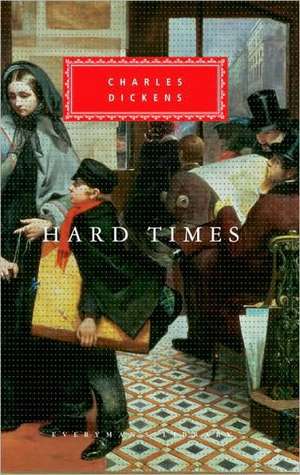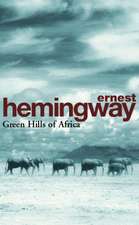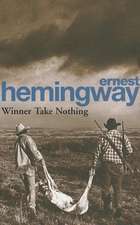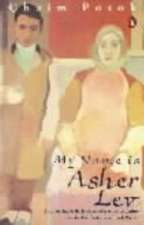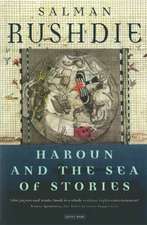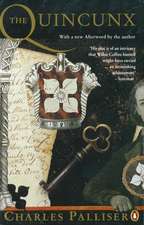Hard Times: Everyman's Library Classics & Contemporary Classics, cartea 0073
Autor Charles Dickens Philip Collinsen Limba Engleză Hardback – 31 mai 1992 – vârsta de la 14 până la 18 ani
By 1854, when Hard Times was published, Charles Dickens' magisterial progress as a writer had come to incorporate a many-sided, coherent vision of English society, both as it was and as he wished it to be. Hard Times, a classic Dickensian story of redemption set in a North of England town beset by industrialism, everywhere benefits from this vision - in the trenchancy of its satire, in its sweeping indignation at social injustice, and in the persistent humanity with which its author enlivens his largest and smallest incidents.
(Book Jacket Status: Jacketed)
Din seria Everyman's Library Classics & Contemporary Classics
-
 Preț: 239.56 lei
Preț: 239.56 lei -
 Preț: 181.46 lei
Preț: 181.46 lei -
 Preț: 155.68 lei
Preț: 155.68 lei -
 Preț: 152.82 lei
Preț: 152.82 lei -
 Preț: 291.22 lei
Preț: 291.22 lei -
 Preț: 156.56 lei
Preț: 156.56 lei -
 Preț: 140.00 lei
Preț: 140.00 lei -
 Preț: 155.68 lei
Preț: 155.68 lei -
 Preț: 176.42 lei
Preț: 176.42 lei -
 Preț: 141.92 lei
Preț: 141.92 lei -
 Preț: 253.70 lei
Preț: 253.70 lei -
 Preț: 187.87 lei
Preț: 187.87 lei - 8%
 Preț: 562.39 lei
Preț: 562.39 lei -
 Preț: 169.01 lei
Preț: 169.01 lei -
 Preț: 217.78 lei
Preț: 217.78 lei -
 Preț: 129.73 lei
Preț: 129.73 lei -
 Preț: 159.81 lei
Preț: 159.81 lei -
 Preț: 132.00 lei
Preț: 132.00 lei -
 Preț: 172.02 lei
Preț: 172.02 lei -
 Preț: 253.60 lei
Preț: 253.60 lei -
 Preț: 286.18 lei
Preț: 286.18 lei -
 Preț: 129.71 lei
Preț: 129.71 lei -
 Preț: 277.35 lei
Preț: 277.35 lei -
 Preț: 192.29 lei
Preț: 192.29 lei -
 Preț: 180.40 lei
Preț: 180.40 lei -
 Preț: 154.68 lei
Preț: 154.68 lei -
 Preț: 254.91 lei
Preț: 254.91 lei -
 Preț: 121.47 lei
Preț: 121.47 lei -
 Preț: 233.19 lei
Preț: 233.19 lei -
 Preț: 177.11 lei
Preț: 177.11 lei -
 Preț: 144.97 lei
Preț: 144.97 lei -
 Preț: 190.28 lei
Preț: 190.28 lei -
![Les Miserables [With Ribbon Marker]](https://i2.books-express.ro/bs/9780375403170/les-miserables-with-ribbon-marker.jpg) Preț: 283.50 lei
Preț: 283.50 lei -
 Preț: 155.90 lei
Preț: 155.90 lei -
 Preț: 162.49 lei
Preț: 162.49 lei -
 Preț: 218.89 lei
Preț: 218.89 lei -
 Preț: 194.89 lei
Preț: 194.89 lei -
 Preț: 179.05 lei
Preț: 179.05 lei -
 Preț: 158.19 lei
Preț: 158.19 lei - 8%
 Preț: 439.96 lei
Preț: 439.96 lei -
 Preț: 155.09 lei
Preț: 155.09 lei -
 Preț: 181.28 lei
Preț: 181.28 lei -
 Preț: 156.31 lei
Preț: 156.31 lei -
 Preț: 138.16 lei
Preț: 138.16 lei -
 Preț: 142.52 lei
Preț: 142.52 lei -
 Preț: 141.27 lei
Preț: 141.27 lei -
 Preț: 126.43 lei
Preț: 126.43 lei -
 Preț: 201.04 lei
Preț: 201.04 lei -
 Preț: 142.93 lei
Preț: 142.93 lei -
 Preț: 183.26 lei
Preț: 183.26 lei
Preț: 131.15 lei
Nou
25.10€ • 26.84$ • 20.92£
Carte indisponibilă temporar
Specificații
ISBN-10: 0679413235
Pagini: 336
Dimensiuni: 134 x 210 x 28 mm
Greutate: 0.49 kg
Editura: Everyman's Library
Seria Everyman's Library Classics & Contemporary Classics
Notă biografică
Extras
The One Thing Needful
“Now, what I want is, Facts. Teach these boys and girls nothing but Facts. Facts alone are wanted in life. Plant nothing else, and root out everything else. You can only form the minds of reasoning animals upon Facts: nothing else will ever be of any service to them. This is the principle on which I bring up my own children, and this is the principle on which I bring up these children. Stick to Facts, Sir!”
The scene was a plain, bare, monotonous vault of a schoolroom, and the speaker’s square forefinger emphasized his observations by underscoring every sentence with a line on the schoolmaster’s sleeve. The emphasis was helped by the speaker’s square wall of a forehead, which had his eyebrows for its base, while his eyes found commodious cellerage in two dark caves, overshadowed by the wall. The emphasis was helped by the speaker’s mouth, which was wide, thin, and hard set. The emphasis was helped by the speaker’s voice, which was inflexible, dry, and dictatorial. The emphasis was helped by the speaker’s hair, which bristled on the skirts of his bald head, a plantation of firs to keep the wind from its shining surface, all covered with knobs, like the crust of a plum pie, as if the head had scarcely warehouse-room for the hard facts stored inside. The speaker’s obstinate carriage, square coat, square legs, square shoulders,—nay, his very neckcloth, trained to take him by the throat with an unaccommodating grasp, like a stubborn fact, as it was,—all helped the emphasis.
“In this life, we want nothing but Facts, Sir; nothing but Facts!”
The speaker, and the schoolmaster, and the third grown person present, all backed a little, and swept with their eyes the inclined plane of little vessels then and there arranged in order, ready to have imperial gallons of facts poured into them until they were full to the brim.
CHAPTER II
Murdering the Innocents
Thomas Gradgrind, Sir. A man of realities. A man of facts and calculations. A man who proceeds upon the principle that two and two are four, and nothing over, and who is not to be talked into allowing for anything over. Thomas Gradgrind, Sir—peremptorily Thomas—Thomas Gradgrind. With a rule and a pair of scales, and the multiplication table always in his pocket, Sir, ready to weigh and measure any parcel of human nature, and tell you exactly what it comes to. It is a mere question of figures, a case of simple arithmetic. You might hope to get some other nonsensical belief into the head of George Gradgrind, or Augustus Gradgrind, or John Gradgrind, or Joseph Gradgrind (all supposititious, non-existent persons), but into the head of Thomas Gradgrind—no, Sir!
In such terms Mr. Gradgrind always mentally introduced himself, whether to his private circle of acquaintance, or to the public in general. In such terms, no doubt, substituting the words “boys and girls,” for “Sir,” Thomas Gradgrind now presented Thomas Gradgrind to the little pitchers before him, who were to be filled so full of facts.
Indeed, as he eagerly sparkled at them from the cellarage before mentioned, he seemed a kind of cannon loaded to the muzzle with facts, and prepared to blow them clean out of the regions of childhood at one discharge. He seemed a galvanizing apparatus, too, charged with a grim mechanical substitute for the tender young imaginations that were to be stormed away.
“Girl number twenty,” said Mr. Gradgrind, squarely pointing with his square forefinger, “I don’t know that girl. Who is that girl?”
“Sissy Jupe, sir,” explained number twenty, blushing, standing up, and curtseying.
“Sissy is not a name,” said Mr. Gradgrind. “Don’t call yourself Sissy. Call yourself Cecilia.”
“It’s father as calls me Sissy, sir,” returned the young girl in a trembling voice, and with another curtsey.
“Then he has no business to do it,” said Mr. Gradgrind. “Tell him he mustn’t. Cecilia Jupe. Let me see. What is your father?”
“He belongs to the horse-riding, if you please, sir.”
Mr. Gradgrind frowned, and waved off the objectionable calling with his hand.
“We don’t want to know anything about that, here. You mustn’t tell us about that, here. Your father breaks horses, don’t he?”
“If you please, sir, when they can get any to break, they do break horses in the ring, sir.”
“You mustn’t tell us about the ring, here. Very well, then. Describe your father as a horsebreaker. He doctors sick horses, I dare say?”
“Oh yes, sir.”
“Very well, then. He is a veterinary surgeon, a farrier and horsebreaker. Give me your definition of a horse.”
(Sissy Jupe thrown into the greatest alarm by this demand.)
“Girl number twenty unable to define a horse!” said Mr. Gradgrind, for the general behoof of all the little pitchers. “Girl number twenty possessed of no facts, in reference to one of the commonest of animals! Some boy’s definition of a horse. Bitzer, yours.”
The square finger, moving here and there, lighted suddenly on Bitzer, perhaps because he chanced to sit in the same ray of sunlight which, darting in at one of the bare windows of the intensely whitewashed room, irradiated Sissy. For, the boys and girls sat on the face of the inclined plane in two compact bodies, divided up the centre by a narrow interval; and Sissy, being at the corner of a row on the sunny side, came in for the beginning of a sunbeam, of which Bitzer, being at the corner of a row on the other side, a few rows in advance, caught the end. But, whereas the girl was so dark-eyed and dark-haired, that she seemed to receive a deeper and more lustrous colour from the sun, when it shone upon her, the boy was so light-eyed and light-haired that the self-same rays appeared to draw out of him what little colour he ever possessed. His cold eyes would hardly have been eyes, but for the short ends of lashes which, by bringing them into immediate contrast with something paler than themselves, expressed their form. His short-cropped hair might have been a mere continuation of the sandy freckles on his forehead and face. His skin was so unwholesomely deficient in the natural tinge, that he looked as though, if he were cut, he would bleed white.
“Bitzer,” said Thomas Gradgrind. “Your definition of a horse.”
“Quadruped. Graminivorous. Forty teeth, namely twenty-four grinders, four eye-teeth, and twelve incisive. Sheds coat in the spring; in marshy countries, sheds hoofs, too. Hoofs hard, but requiring to be shod with iron. Age known by marks in mouth.” Thus (and much more) Bitzer.
“Now girl number twenty,” said Mr. Gradgrind. “You know what a horse is.”
She curtseyed again, and would have blushed deeper, if she could have blushed deeper than she had blushed all this time. Bitzer, after rapidly blinking at Thomas Gradgrind with both eyes at once, and so catching the light upon his quivering ends of lashes that they looked like the antennæ of busy insects, put his knuckles to his freckled forehead, and sat down again.
The third gentleman now stepped forth. A mighty man at cutting and drying, he was; a government officer; in his way (and in most other people’s too), a professed pugilist; always in training, always with a system to force down the general throat like a bolus, always to be heard of at the bar of his little Public-office, ready to fight all England. To continue in fistic phraseology, he had a genius for coming up to the scratch,2 wherever and whatever it was, and proving himself an ugly customer. He would go in and damage any subject whatever with his right, follow up with his left, stop, exchange, counter, bore his opponent (he always fought All England)3 to the ropes, and fall upon him neatly. He was certain to knock the wind out of common sense, and render that unlucky adversary deaf to the call of time. And he had it in charge from high authority to bring about the great public- office Millennium, when Commissioners should reign upon earth.
“Very well,” said this gentleman, briskly smiling, and folding his arms. “That’s a horse. Now, let me ask you girls and boys, Would you paper a room with representations of horses?”
After a pause, one half of the children cried in chorus, “Yes, Sir!” Upon which the other half, seeing in the gentleman’s face that Yes was wrong, cried out in chorus, “No, Sir!”—as the custom is, in these examinations.
“Of course, No. Why wouldn’t you?”
A pause. One corpulent slow boy, with a wheezy manner of breathing, ventured the answer, Because he wouldn’t paper a room at all, but would paint it.
“You must paper it,” said the gentleman, rather warmly.
“You must paper it,” said Thomas Gradgrind, “whether you like it or not. Don’t tell us you wouldn’t paper it. What do you mean, boy?”
From the Trade Paperback edition.
Textul de pe ultima copertă
Recenzii
– F.R. Leavis
"A masterpiece...a completely serious work of art" -- F.R.Leavis "The greatest of Dickens' work...should be studied with close and earnest care" -- John Ruskin "Big and earnest, though circus folk and bank robbery add colour to its canvas of industrialists and loveless marriages" Sunday Times
Descriere
Set in an industrial city in Northern England during the Victorian era, Thomas Gradgrind, a wealthy and retired man, devotes his life to the rationalist philosophy, and raises his children, Louisa and Tom, to never engage in any imaginative activity. The two grow up feeling confused, like something is missing in their lives, yet are unable figure out what exactly that is and affected differently by their upbringing. Louisa struggles to feel joy, and Tom struggles to find ethical standards. When Josiah Bounderby, a crass, rich man, asks for Louisa's hand in marriage, she cannot find a rational reason not to marry him. He would elevate her social status, was a friend of her father, and employed her brother at his bank. She decides to marry Bounderby, despite feeling no love for him. Meanwhile, Stephen, a poor laborer in one of the city's factories, who is struggling under the oppression of the upper classes, meets Tom and Louisa, inspiring them in different ways. When the city is shocked by a scandalous and devastating bank robbery, Stephen, Tom, and Louisa's lives are forever changed, and Gradgrind must question the strict beliefs on which he relies. Hard Times by Charles Dickens is revered not only for its skillfully constructed prose, but also its critique of capitalist and utilitarian philosophy. Dickens' empathetic portrayal of the effects of such beliefs raises concern and advocates for the conservation of human creativity and joy in a way that is still applicable today. With an eye-catching cover design and a modern font, Hard Times by Charles Dickens is a thought-provoking novel written by the greatest and most influential writers of the Victorian era.
